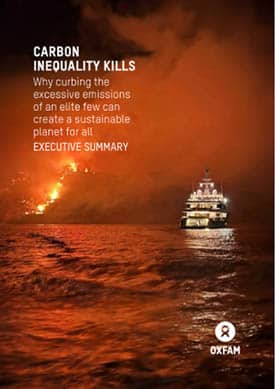
The private jets of 23 super-rich individuals emitted an average of 2,074 tonnes of carbon a year. This is equivalent to 2,000 years’ worth emissions for someone in the global poorest 50%. On average, these super-rich individuals took 184 flights in 2023, spending 425 hours in the air. (Oxfam)
The carbon footprint of a super-rich European, accumulated from nearly a week of using super yachts and private jets, matches the lifetime carbon footprint of someone in the world’s poorest 1 percent, a new Oxfam report shows. The study, Carbon Inequality Kills, tracks the emissions from private jets, yachts and polluting investments, amidst growing fears that climate breakdown is accelerating, driven largely by the emissions of the richest people.
“The super-rich in Europe are treating our planet like their personal playground. Their dirty investments, their private jets and yachts are not just symbols of excess; they are fueling inequality, hunger and even death”, said Chiara Putaturo, Oxfam EU tax expert.
The report presents detailed new evidence of how the super-rich’s outsized emissions are accelerating climate breakdown and wreaking havoc on lives and economies. The world’s poorest countries and communities have done the least to cause the climate crisis, yet they experience its most dangerous consequences.
- One ultra-rich European takes an average of 140 flights a year, spending 267 hours in the air and producing as much carbon as the average European would in over 112 years.
- In the same period, one superyacht user emits as much carbon as an ordinary European would in 585 years.
- Less than a week of emissions from the superyachts and jets of one of the 31 of the richest people in the EU exceeded the entire lifetime emissions of a person in the world’s poorest 1%.
- Fifty of the world’s richest billionaires on average emit more carbon through their investments, private jets and yachts in just over an hour and a half than the average person does in their entire lifetime.
 If the world continues its current emissions, the carbon budget (the amount of CO2 that can still be added to the atmosphere without causing global temperatures to rise above 1.5°C) will be depleted in about four years.
If the world continues its current emissions, the carbon budget (the amount of CO2 that can still be added to the atmosphere without causing global temperatures to rise above 1.5°C) will be depleted in about four years.
However, if everyone’s emissions matched those of the richest 1 percent, the carbon budget would be used up in under five months.
And if everyone started emitting as much carbon as the private jets and superyachts of the average billionaire in Oxfam’s study, it would be gone in two days.
Billionaires’ lifestyle emissions dwarf those of ordinary people, but the emissions from their investments are dramatically higher still — the average investment emissions of 50 of the world’s richest billionaires are around 340 times their emissions from private jets and superyachts combined. Through these investments, billionaires have huge influence over some of the world’s biggest corporations and are driving us over the edge of climate disaster.
Nearly 40 percent of billionaire investments analyzed in Oxfam’s research are in highly polluting industries: oil, mining, shipping and cement. The total investment emissions of 36 of the EU’s richest billionaires are equivalent to the annual emissions of over 4.5 million Europeans.
Oxfam’s analysis details three critical areas, providing national and regional breakdowns, where the emissions of the wealthiest 1 percent since 1990 are already having — and are projected to have — devastating consequences:
- Global inequality. The emissions of the richest 1 percent in the EU have caused global economic output to drop by 179 billion international US dollars since 1990. The biggest impact will be in countries least responsible for climate breakdown. Globally, low- and lower-middle-income countries will lose about 2.5 percent of their cumulative GDP between 1990 and 2050 due to the climate crisis. South Asia, South-East Asia and Sub-Saharan Africa will lose 3 percent, 2.4 percent and 2.4 percent, respectively. High-income countries, on the other hand, will accrue economic gains.
- Hunger. The emissions of the richest 1 percent in the EU have caused crop losses due the climate crisis. These crop losses could have provided enough calories to feed nearly 900,000 people a year between 1990 and 2023. This will rise to 1.7 million people annually between 2023 and 2050.
- Death. The emissions of the richest 1 percent in the EU are enough to cause 1.5 million excess heat-related deaths between 2020 and 2120.


